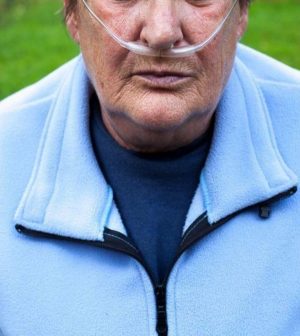- The Best Time of Day to Drink Bone Broth to Maximize Health Benefits
- 8 Ways to Increase Dopamine Naturally
- 7 Best Breads for Maintaining Stable Blood Sugar
- Gelatin vs. Collagen: Which is Best for Skin, Nails, and Joints?
- The Long-Term Effects of Daily Turmeric Supplements on Liver Health
- Could Your Grocery Store Meat Be Causing Recurring UTIs?
- Are You Making This Expensive Thermostat Error This Winter?
- Recognizing the Signs of Hypothyroidism
- 10 Strategies to Overcome Insomnia
- Could Artificial Sweeteners Be Aging the Brain Faster?
Global Warming Could Worsen COPD Symptoms

Hotter weather driven by climate change is bad news for people with chronic obstructive pulmonary disease (COPD), a new study warns.
Researchers say warming trends could worsen COPD symptoms, such as shortness of breath, wheezing or coughing. Millions of people have COPD, a combination of emphysema and chronic bronchitis that is often tied to smoking.
“The climate emergency is proving to have far-reaching effects in areas of everyday life where it might not necessarily be expected to have an impact,” said Zorana Andersen, chair of the European Respiratory Society environment and health committee, and a professor of environmental epidemiology at the University of Copenhagen in Denmark.
“This study offers a fascinating insight into the way it could be affecting the lives of people living with COPD and is yet more proof of the urgent need to tackle climate change and the world’s rising temperatures,” Andersen said in a respiratory society news release.
She was not involved in the study.
The researchers analyzed data collected from almost 1,200 current and former smokers with COPD in the United States who enrolled in a study between 2010 and 2015. Their average age was 64 and they’d had at least one COPD exacerbation since joining the study.
Their risk of COPD exacerbations increased with rising temperatures during the preceding six days, with the highest risk two days after temperatures climbed, according to the study. The findings will be presented Sunday at a virtual meeting of the respiratory society.
“We found that each 1-degree Celsius increase in ambient temperature was associated with a 2% increase in the likelihood of COPD exacerbations in the following two days among this group of patients,” said study author Dr. Supaksh Gupta, a pulmonary and critical care fellow at the University of Washington.
Gupta said the study contributes to the emerging body of knowledge regarding air temperature and risk of COPD-related health problems. A major strength of the study is the number of people included, who live in various major U.S. towns and cities, Gupta added.
“Our findings raise concerns about the risk of increased exacerbations with climate change. While not conclusive, the study suggests that those living with COPD may want to avoid exposure to adverse and extreme environmental conditions by limiting outdoor activities during periods of elevated temperatures,” Gupta said.
Findings presented at meetings should be considered preliminary until published in a peer-reviewed medical journal.
More information
The U.S. National Heart, Lung, and Blood Institute has more on COPD.
SOURCE: European Respiratory Society, news release, Sept. 3, 2021
Source: HealthDay
Copyright © 2026 HealthDay. All rights reserved.










